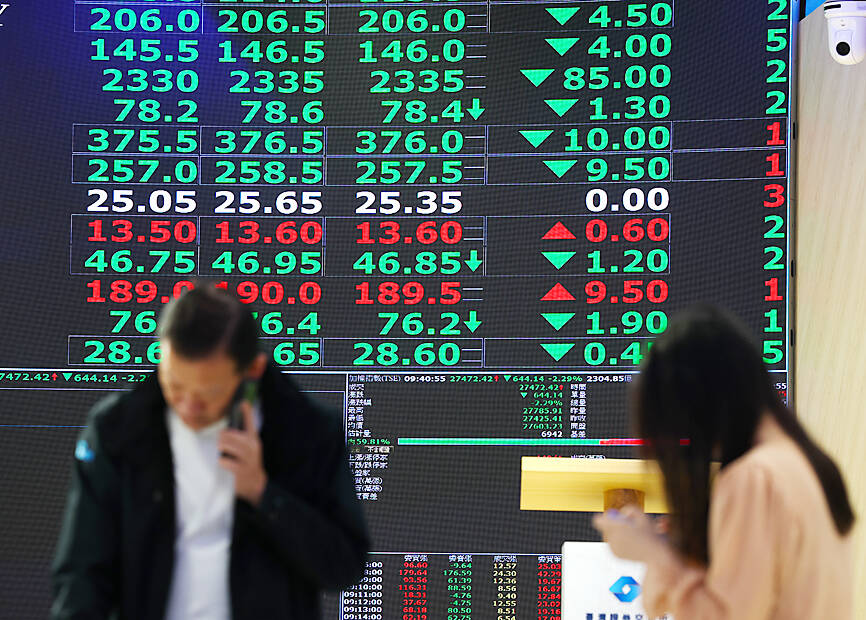Taiwanese stocks tumbled yesterday as global risk aversion intensified, with the benchmark TAIEX sliding 3.61 percent, or 991 points, marking the sixth-largest single-day point drop in history, brokers said.
The retreat surpassed that of Hong Kong’s Hang Seng Index, which fell 2.38 percent, and Japan’s Nikkei 225, down 2.4 percent, but was slightly milder than South Korea’s KOSPI, which fell 3.79 percent.
Investors accelerated selling amid growing uncertainty over whether the US Federal Reserve would cut interest rates following stronger-than-expected US job data.

Photo: CNA
Local stocks opened sharply lower and plunged more than 1,000 points at one point. Turnover totaled NT$549.8 billion (US$17.49 billion), reflecting heightened investor anxiety.
“Concerns over artificial intelligence [AI] valuations have resurfaced, weighing on tech and AI-themed names,” Allianz Global Investors Taiwan (安聯投信) said. “The combination of lofty valuations in AI-related shares and lower odds of a rate cut has pressured global tech stocks, with the effects spilling over into Taiwan.”
The latest US nonfarm payroll report released on Thursday showed an unexpected addition of 119,000 jobs in September, significantly reducing expectations that the Fed would cut rates next month.
Allianz Taiwan said that volatility driven by market sentiment was likely to persist, as investors continue to monitor developments in AI applications and global monetary policy.
Leading the sell-off was Taiwan Semiconductor Manufacturing Co (TSMC, 台積電), the world’s largest contract maker of advanced chips, which fell 4.81 percent to NT$1,385. The drop followed cues from US clients, including Nvidia Corp and Advanced Micro Devices Inc, highlighting the sensitivity of Taiwan’s tech-heavy index to global developments.
Foreign investors were net sellers of NT$91.54 billion, marking the largest net sell-off of the year and the fourth-largest in Taiwan’s history. Mutual funds reported net selling of NT$1.26 billion, while proprietary traders reduced positions by NT$15.27 billion.
Despite the heavy selling, analysts said that the movement reflected selective portfolio adjustments rather than a wholesale exit.
BNP Paribas APAC equity and derivative strategy said that recent capital outflows from South Korea and Taiwan were partly profit-taking and partly a reassessment of stretched valuations in AI and semiconductor stocks.
Global investors are rotating, being more selective, and rethinking how they should allocate to Asia, it said, adding that this movement is largely about portfolio rebalancing and risk management rather than a full-blown exit.
The reassessment also weighed on the New Taiwan dollar, which weakened NT$0.135 against the US dollar to close at NT$31.43.
Analysts said that elevated global risk sentiment could keep volatility high across both equity and foreign exchange markets.

JITTERS: Nexperia has a 20 percent market share for chips powering simpler features such as window controls, and changing supply chains could take years European carmakers are looking into ways to scratch components made with parts from China, spooked by deepening geopolitical spats playing out through chipmaker Nexperia BV and Beijing’s export controls on rare earths. To protect operations from trade ructions, several automakers are pushing major suppliers to find permanent alternatives to Chinese semiconductors, people familiar with the matter said. The industry is considering broader changes to its supply chain to adapt to shifting geopolitics, Europe’s main suppliers lobby CLEPA head Matthias Zink said. “We had some indications already — questions like: ‘How can you supply me without this dependency on China?’” Zink, who also

The number of Taiwanese working in the US rose to a record high of 137,000 last year, driven largely by Taiwan Semiconductor Manufacturing Co’s (TSMC, 台積電) rapid overseas expansion, according to government data released yesterday. A total of 666,000 Taiwanese nationals were employed abroad last year, an increase of 45,000 from 2023 and the highest level since the COVID-19 pandemic, data from the Directorate-General of Budget, Accounting and Statistics (DGBAS) showed. Overseas employment had steadily increased between 2009 and 2019, peaking at 739,000, before plunging to 319,000 in 2021 amid US-China trade tensions, global supply chain shifts, reshoring by Taiwanese companies and

Taiwan Semiconductor Manufacturing Co (TSMC, 台積電) received about NT$147 billion (US$4.71 billion) in subsidies from the US, Japanese, German and Chinese governments over the past two years for its global expansion. Financial data compiled by the world’s largest contract chipmaker showed the company secured NT$4.77 billion in subsidies from the governments in the third quarter, bringing the total for the first three quarters of the year to about NT$71.9 billion. Along with the NT$75.16 billion in financial aid TSMC received last year, the chipmaker obtained NT$147 billion in subsidies in almost two years, the data showed. The subsidies received by its subsidiaries —

At least US$50 million for the freedom of an Emirati sheikh: That is the king’s ransom paid two weeks ago to militants linked to al-Qaeda who are pushing to topple the Malian government and impose Islamic law. Alongside a crippling fuel blockade, the Group for the Support of Islam and Muslims (JNIM) has made kidnapping wealthy foreigners for a ransom a pillar of its strategy of “economic jihad.” Its goal: Oust the junta, which has struggled to contain Mali’s decade-long insurgency since taking power following back-to-back coups in 2020 and 2021, by scaring away investors and paralyzing the west African country’s economy.